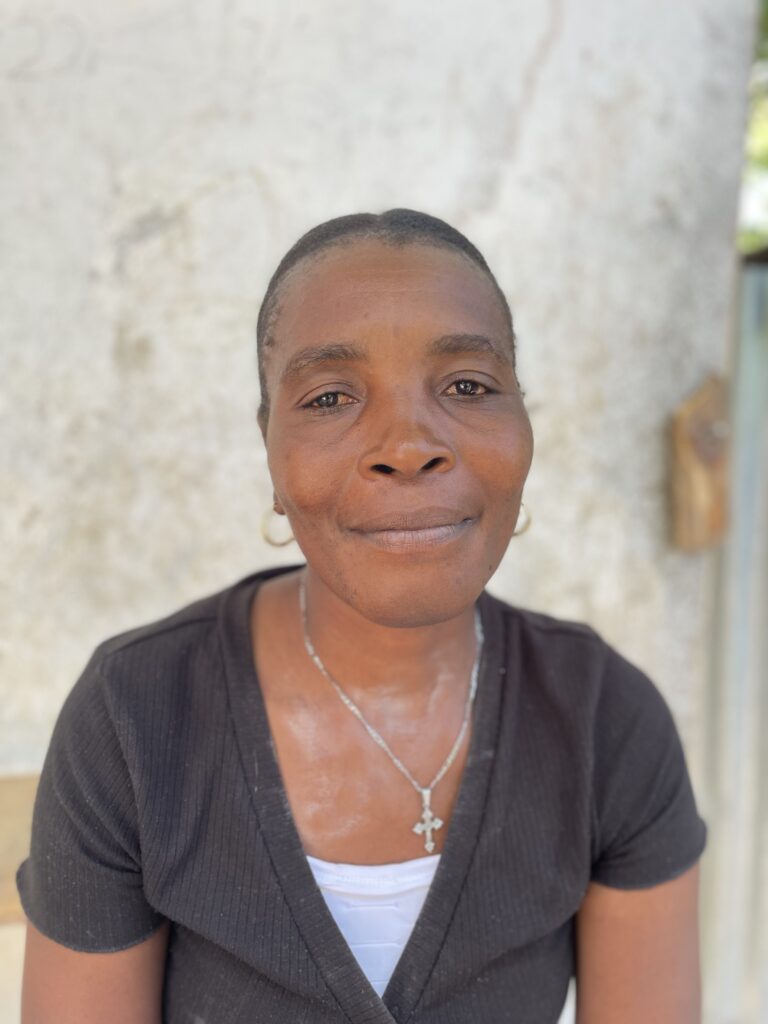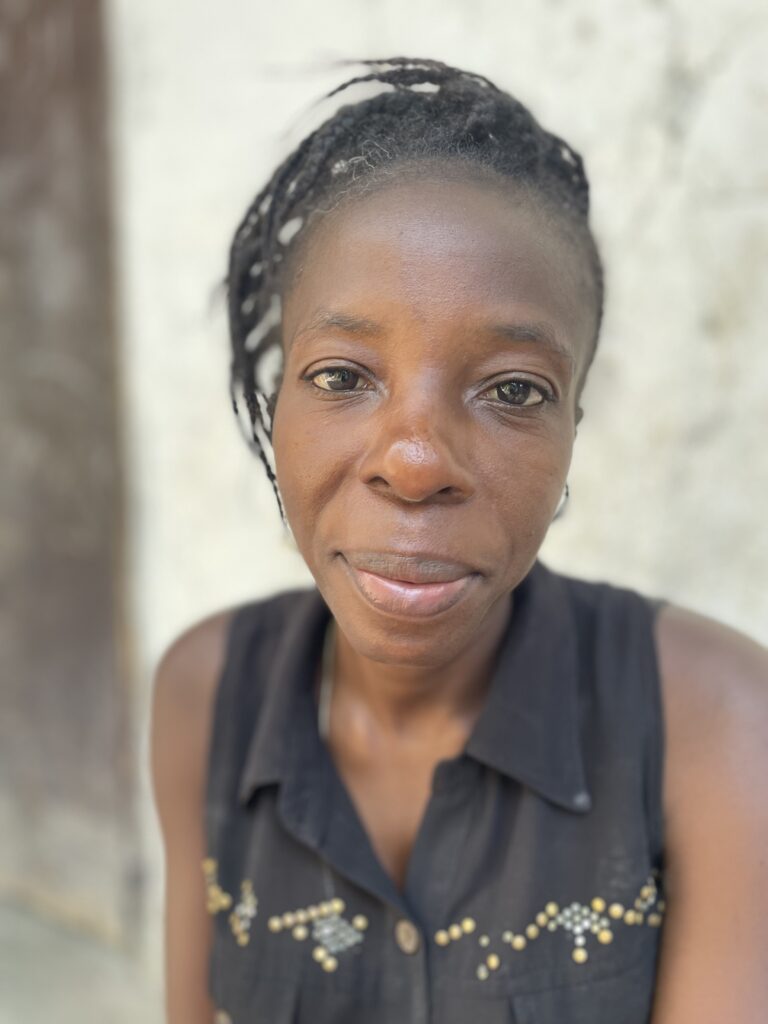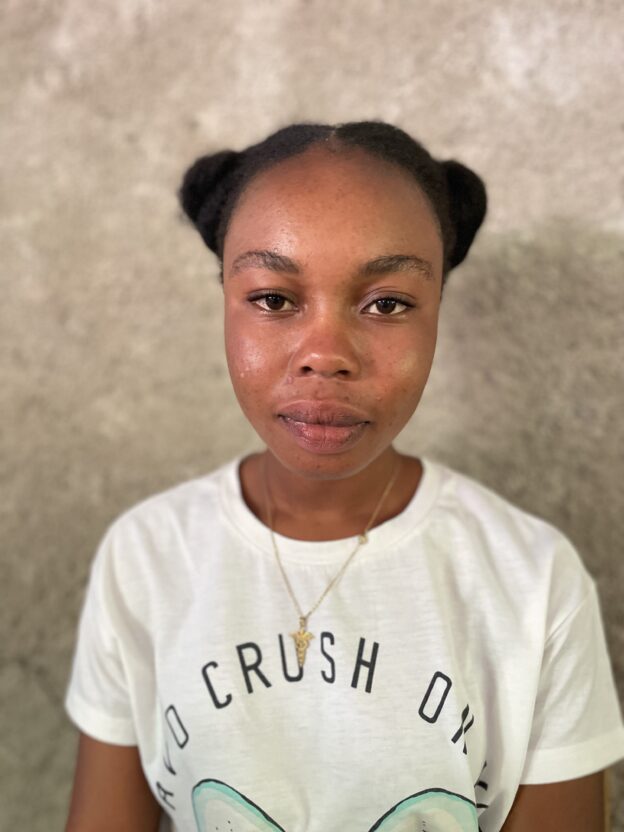Rose-Manie lives in Bezwen, an area above Kalabat, a small market in eastern Gwomòn that is the location of a parish church. She has one child, a three-year-old boy, whom she is raising without help from his father. The two of them live with her parents and her younger siblings.
She was able to start a small commerce even before she joined CLM. After weaning her baby, she left him in her mother’s care and moved to Gonayiv, the large city south of Gwomòn, to work as a maid. “I cooked and cleaned and did laundry.” She made 7,500 gourds per month, and she refused to spend any of it. So when she returned home after three months, she had 22,500 gourds she could invest. That is about $175. She arrived home during mango season, so she quickly added to her capital by buying and selling mangoes. When she shifted to selling groceries, she had almost $200. She sold rice, cooking oil, and the range of basics that Haitian cooks depend upon.
But Rose-Manie got sick, and her business capital slowly disappeared. For one thing, she continued to have to spend to feed herself and her boy even when she was too sick to work. For another, the medical expenses themselves were considerable. By the time she joined the program, she and her boy were largely depending on her folks.
But things have started to change since she joined the program. She bought a goat with 9,000 gourds of the first 15,000 gourds of her investment fund. She is trying to buy a smaller goat with the remaining 6,000, but she hasn’t found one that she likes yet. She hopes that if she takes good care of the goats, she can accumulate them until she has enough to sell them to buy a cow.
She expects to receive the remaining funds for investment soon, and plans to invest it to start her old business once again. She is optimistic. “Jodi a w ka gen yon bak sirèt. Demen se tout yon boutik.” A bak is a small wooden table that merchants use when they are selling just sirèt, or candy, and maybe some packaged cookies and crackers. It is a standard example of an especially small business. Rose-Manie is saying that one day you have nothing but a small table of snacks, and the next you can have your own shop.

Enide lives above Kalabat as well. Her neighborhood is Filyon. She has five children. A few years ago, when she saw that she could no longer send them all to school, she gave two of the older ones some money, and she sent them to live with a friend in Pòdpè, the major coastal city north of Gwomòn.
She and the two young women thought that the two would run their own commerce in the city and send themselves to school. The plan worked, except that her daughters found that they could not stay with the family who initially hosted them, and Enide had to borrow money to help them rent a room.
She borrowed the money from a village savings and loan association that had been functioning in the area even before CLM got there. She managed to repay what she owed, but then the association fell apart. “People borrowed money, but then they didn’t pay it back.”
The father of her younger children is around the area, but he doesn’t really help Enide with their kids. He’s married to someone else. “I’m their mother and their father. I sleep with them and get up with them every day.”
But she finds it hard to get ahead. She says, “Yon sèl dwèt pa manje kalalou.” That means that you can’t eat okra with just one finger. Okra is famously slippery. The phrase is a common Haitian proverb used to explain the need for teamwork. Everything Enide does, she has to do alone, and that makes life difficult.
She is excited about the goats she was able to buy with the first payment of her CLM investment fund. She bought two. “If I take care of them, and they reproduce, I won’t have to worry how I will send my youngest to school.” Her youngest is a son named Woodkervens, and he is just six, so he has a lot of years of school ahead of him. If she gets the number of her goats up over the next year or so, it won’t be a problem for her to sell one now and again for school fees and related expenses.
She is waiting impatiently for the rest of her transfer. She wants to invest it in her commerce. Her business model is simple. There are two large markets higher up into the mountains, farther to the east, Twa Pòto and Dandi. She buys produce there, and brings it down to Gwomòn for sale. It is a straightforward model. Produce is cheaper in such markets than it is downtown.
Up to now, she has been managing with credit. She goes to neighbors, borrows 5,000 gourds or so, and repays it the next day, when she gets back from selling in Gwomòn. They don’t charge her interest. “If I borrow from a woman, I might give her some of whatever I bought with the money. If I borrow from a man, I just say ‘thanks.’ If they see you always pay, you can usually find a loan.” But without any of her own funds, her business cannot grow. She plans to keep borrowing after she gets the money from CLM, but she’ll be adding to her own funds rather than depending on borrowed money alone.

Jolette lives in another neighborhood of Kalabat. She has a twenty-year-old son finishing high school in downtown Gwomòn and a baby with her in Kalabat. Until recently, she lived with her mother, but her mother kicked her out when she became pregnant with her second child, and she moved in with the girl’s father, Ancelot. She had had her son with another man, but he was married.
She had struggled to build the room of her mother’s house that she lived in. She sold cosmetics or groceries. Her business changed from time to time. But the expense of sending her son to school eventually ate up her capital. The shack she moved into with her girl’s father was falling apart even before she got there.
When she first joined the program, she struggled to eat even once a day. “If I ate on Sunday, I wouldn’t have anything on Monday.” The weekly stipend helped a lot. And it helped her support her son in school, too. “If I ate 50 gourds of food, I would save 50 gourds to send to my son.”
She used the first payment of her investment fund to buy a sow and a goat. “The pig will have piglets, and I will be able to sell them. My boy will be ready for college this coming year, and it will cost a lot.”
All through the conversation, Jolette keeps returning to her son’s needs. She barely seems to think about other things. “Everything I do is for my children.”
